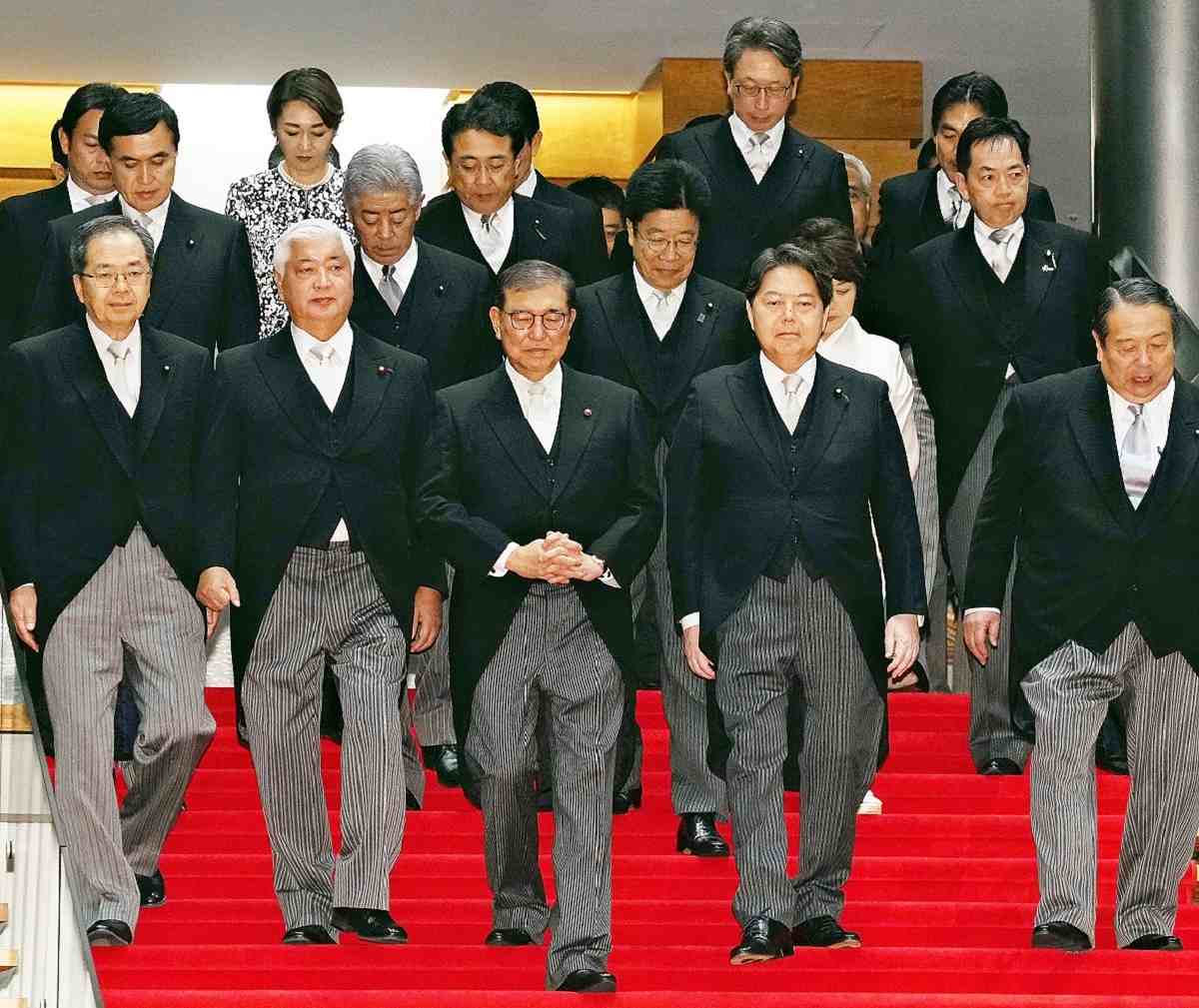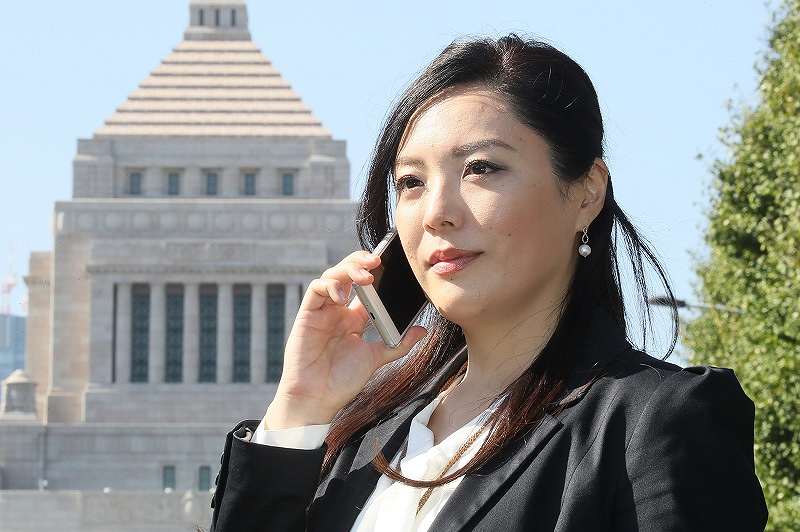
Prime Minister Shigeru Ishiba, center, and other ministers descend a stairway for commemorative photos on Tuesday at the Prime Minister’s Office in Tokyo.
8:00 JST, October 5, 2024
The LDP presidential election, in which a record nine candidates ran, ended with Shigeru Ishiba’s upset victory in a runoff. Ishiba won the presidency in his fifth run for the office and became prime minister on October 1.
The outcome of the runoff election against Sanae Takaichi was unclear until the very last moment. Takaichi, who has a strong conservative leaning, gained momentum in the latter half of the election campaign period and came in first in the first round of voting. The prospect of Takaichi as prime minister is thought to have prompted votes for Ishiba due to concerns among Diet members that diplomatic relations with China and South Korea might deteriorate.
Ishiba’s lifework has been pursuing security policy. He has experience both as director general of the former Defense Agency and as defense minister. As prime minister, he will now face world leaders and tackle difficult issues such as the security environment in East Asia and U.S.-China tensions. While there were fears about Takaichi’s prospective relations with China and South Korea, concerns have emerged about Ishiba’s steering of Japan-U.S. relations.
During the election campaign, Ishiba said he would begin a review of the Japan-U.S. Status of Forces Agreement, which stipulates the legal treatment of U.S. forces when they are active in Japan. Ishiba also said: “As the power of the U.S. declines in relative terms, how can we create a system of collective security in this region? We should organically combine many alliances such as Japan-U.S., U.S.-South Korea, and U.S.-Philippines.” He called for the creation of a system of collective security in Asia similar to the North Atlantic Treaty Organization. He also expressed the view that this would be an extension of the Quad, a cooperative framework between Japan, the United States, Australia and India.
Japanese government officials are concerned that Ishiba’s musings will lead to a repeat of what happened during the 2009-10 administration of Prime Minister Yukio Hatoyama of the Democratic Party of Japan. One of Ishiba’s rival candidates in the presidential election commented, “It’s a very risky statement, and if he fails to follow up on it, he could end up with the same result as Prime Minister Hatoyama.” A senior Japanese government official also said, “If he raises the issue against the U.S. and ends up as a failure, that would be no different from Prime Minister Hatoyama.” The Wall Street Journal also commented in the opening of a breaking news article about the presidential election, “Japan’s next leader will be a former defense minister who wants to reshape what he sees as an unequal alliance with the U.S., presaging possible tensions with Washington.”
In the 2009 House of Representatives election that led to the change of government from the LDP to the DPJ, then candidate Hatoyama promised to achieve the long-sought relocation of the U.S. military’s Futenma Air Station from its present site in Ginowan, Okinawa Prefecture — but he threw the existing relocation plans into disarray by going further and saying, “At the very least, we will relocate it outside the prefecture.” After becoming prime minister, he tried to make that happen but failed. When he resigned as prime minister without having fulfilled his campaign pledge, Hatoyama finally acknowledged the strategic importance of Okinawa, saying, “The more I learn, the more I understand the importance of deterrence,” but the damage had been done, and Japan-U.S. relations fell to nearly their worst level since the war.
The United States is likely to find it difficult to accept a review of the Status of Forces Agreement, as it wants to maintain the status and rights given to the U.S. military deployed to defend Japan. As for an Asian version of NATO, while NATO members share an awareness of the threat from Russia, the lack of recognition of a common threat in Asia would make it difficult to establish the organization and gain the support of the United States.
Currently, the military threat from China and Russia is only getting stronger. The first-ever violation of Japanese airspace by a Chinese military aircraft occurred on Aug. 26, followed by the Chinese aircraft carrier Liaoning making an unprecedented voyage between Yonaguni Island and Iriomote Island of Okinawa Prefecture on Sept. 18, during the LDP presidential election. Then, on Sept. 25, China launched an intercontinental ballistic missile, dropping it into the open sea, for the first time in 44 years. China Coast Guard vessels have made a habit of passing through the contiguous zone around the Senkaku Islands and even invading Japanese territorial waters.
Looking north, on Sept. 23, a Russian military aircraft violated Japanese airspace three times around Rebun Island, Hokkaido. For the first time, a Self-Defense Force aircraft fired flares as a measure against the violation of Japanese airspace. Furthermore, the Chinese and Russian militaries have repeatedly engaged in joint demonstrations at sea and in the air threatening Japan.
In this security environment, if Japan-U.S. relations falter and deteriorate as they did under the Hatoyama administration, there is concern that China and Russia will take advantage of the gap to escalate their activities. Ishiba, who is considered an expert on security policy, will be asked what his diplomatic priorities will be.
Autumn is the “season for diplomacy,” bringing a succession of international conferences. Chinese President Xi Jinping may attend the Association of Southeast Asian Nations summit in the coming week, followed by the Asia-Pacific Economic Cooperation summit and the Group of 20 summit, both in mid-November. Japan is seeking to hold a Japan-China summit in November to coincide with the APEC and G20 events, aiming to realize a first meeting between the new prime minister and Xi. China is expected to respond based on the new Japanese administration’s China policy.
Meanwhile, after the U.S. presidential election in November, a new relationship will be built between the new leaders of Japan and the United States. The administration of Ishiba’s immediate predecessor, Prime Minister Fumio Kishida, has promoted a drastic strengthening of defense capabilities and deepened trust with the United States. To prepare for an emergency in East Asia, the Self-Defense Forces and the U.S. military will expand cooperation in command and control of their forces. It is necessary to encourage the new administration to get involved in security issues in Asia.
Ishiba, like previous prime ministers, is expected to aim for an early visit to the United States. What is needed is diplomacy that strengthens ties not only with the United States, but also with countries that share common values, such as South Korea, Australia, Europe and some nations of Southeast Asia.
Norihiko Narita, a political science scholar and professor emeritus at Surugadai University, said, “The LDP is a party that has used all kinds of ingenuity to survive in order to maintain power.” He believes the party will stop Ishiba from worsening Japan-U.S. relations as Hatoyama did.
During the presidential election, Ishiba often said, “The LDP must be a humble party.” As the security environment becomes increasingly severe, LDP members must be hoping that Ishiba will “humbly” learn from the past mistakes of the DPJ.
Political Pulse appears every Saturday.

Yukiko Ishikawa
Yukiko Ishikawa is a deputy editor in the Political News Department of The Yomiuri Shimbun.
Top Articles in Editorial & Columns
-

Riku-Ryu Pair Wins Gold Medal: Their Strong Bond Leads to Major Comeback Victory
-

40 Million Foreign Visitors to Japan: Urgent Measures Should Be Implemented to Tackle Overtourism
-

China Provoked Takaichi into Risky Move of Dissolving House of Representatives, But It’s a Gamble She Just Might Win
-

University of Tokyo Professor Arrested: Serious Lack of Ethical Sense, Failure of Institutional Governance
-

Policy Measures on Foreign Nationals: How Should Stricter Regulations and Coexistence Be Balanced?
JN ACCESS RANKING
-

Japan PM Takaichi’s Cabinet Resigns en Masse
-

Japan Institute to Use Domestic Commercial Optical Lattice Clock to Set Japan Standard Time
-

Israeli Ambassador to Japan Speaks about Japan’s Role in the Reconstruction of Gaza
-

Man Infected with Measles Reportedly Dined at Restaurant in Tokyo Station
-

Videos Plagiarized, Reposted with False Subtitles Claiming ‘Ryukyu Belongs to China’; Anti-China False Information Also Posted in Japan























